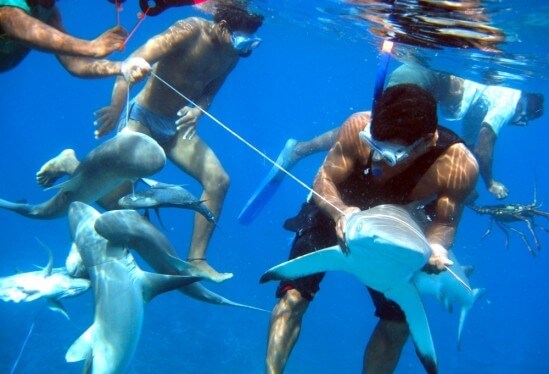In the 19th century, some scholars say the near-extinction of the American bison led to the near-collapse of midwestern Native American cultures. That other civilizations have been affected in similar ways demonstrates the deep interconnectedness between the health of a society and the health of its wildlife.
In a paper appearing today in the journal Science, an interdisciplinary team of researchers that includes UC Santa Barbara’s Douglas McCauley examines how wildlife decline can result in loss of food and employment, which in turn engenders increased crime and fosters political instability.
“These links are poorly recognized by many environmental leaders,” said McCauley, an assistant professor in UCSB’s Department of Ecology, Evolution and Marine Biology, who offers other examples of this correlation. “The population crash of cod caused the disintegration of centuries-old coastal communities in Canada and cost billions of dollars in relief aid. The collapse of fisheries in Somalia contributed to explosions in local and international maritime violence.”
According to lead author Justin Brashares, associate professor of ecology and conservation in UC Berkeley’s Department of Environmental Science, Policy and Management, the effects of global wildlife declines drive violent conflicts, organized crime and even child labor, necessitating a far greater collaboration with disciplines beyond conservation biology.
“Impoverished families rely upon wildlife resources for their livelihoods,” he said. “We can’t apply economic models that prescribe increases in prices or reduced demand as supplies become scarce. Instead, more labor is required to capture scarce wild animals and fish, and children are a major source of cheap labor. Hundreds of thousands of impoverished families are selling their kids to work in harsh conditions.”
The paper connects the dots between the rise of piracy and maritime violence in Somalia to battles over fishing rights. What began as an effort to repel foreign vessels illegally trawling in Somali waters escalated into hijacking fishing and then nonfishing vessels for ransom.
The authors compare wildlife poaching to the drug trade, noting that huge profits from the trafficking of luxury wildlife goods such as elephant tusks and rhino horns have attracted guerilla groups and crime syndicates worldwide. They point to the Lord’s Resistance Army, al-Shabab and Boko Haram as groups known to use wildlife poaching to fund terrorist attacks.
McCauley and his colleagues note that solving the problem of wildlife trafficking is every bit as complex as slowing drug trafficking and will require a multi-pronged approach. “What we don’t want to do is simply start a war on poachers that copies methods being used without great success in our war on drugs,” said McCauley, who began this work as a postdoctoral researcher in Brashares’ lab.
The report stresses the hopefulness of addressing the problems of wildlife loss. “Fixing social problems that stem from a scarcity of wildlife is different — and fundamentally more hopeful — than fixing social problems that arise from other types of natural resource scarcity,” McCauley said. “With money and good politics we can breed more rhino, but we can’t make more diamonds or oil.”
As potential models for an integrated approach, the researchers point to organizations and initiatives in the field of climate change, such as the Intergovernmental Panel on Climate Change and the United for Wildlife Collaboration. But they note that those global efforts must also be accompanied by multidisciplinary programs that address wildlife declines at local and regional levels.
As examples, they cite local governments in Fiji and Namibia that head off social tension in their respective countries by granting exclusive rights to hunting and fishing grounds and by using management zones to reduce poaching and improve the livelihoods of local populations.
“This prescribed revisioning of why we should conserve wildlife helps make clearer what the stakes are in this game,” said McCauley. “Losses of wildlife essentially pull the rug out from underneath societies that depend on these resources. We are not just losing species; we are losing children, breaking apart communities and fostering crime. This makes wildlife conservation a more important job than it ever has been.”


